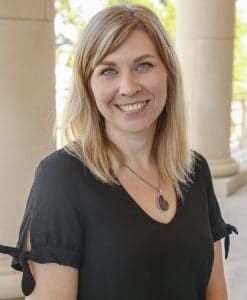
D’Ambrosia was hired as an assistant professor of biology and will oversee the Marine Biology degree option this fall semester. She will also maintain the University’s partnerships with the Gulf Coast Research Lab in Ocean Springs, Mississippi, as well as the Dauphin Island Sea Lab off the coast of Alabama.
In addition to advising SAU students interested in the marine sciences, D’Ambrosia will teach classes in Introductory Biology, Marine Biology, and Oceanography, as well as advanced courses in global climate change and marine paleontology.
“Dr. D’Ambrosia brings a unique background to SAU,” said Dr. Abe Tucker, chair of the Biology Department. “In addition to her background in biology, she has research and teaching experience in paleontology, geology, ecology, and climatology. She will bring a novel perspective to the Biology Department and the SAU community.”
Originally from Easthampton, Massachusetts, D’Ambrosia earned her B.S. in Geology from Smith College as well as an M.S. in Earth Sciences and a Ph.D. in Earth and Environmental Science, both at University of New Hampshire. Before joining SAU, she taught courses in global environmental change, sedimentology, stratigraphy and marine geology at a number of universities, including University of New Hampshire, Boston College, and Amherst College.
She will bring a novel perspective to the Biology Department and the SAU community.
D’Ambrosia’s research uses fossil evidence to study ancient climate-ecosystem interactions. During her research career, D’Ambrosia contributed to a number of significant paleobiology projects. Recently, she conducted field research in Wyoming, where she examined paleontological, stable isotope, and geological evidence recording a series of extreme global warming events that took place 55 million years ago and tracked their impact on mammal species. She published much of this work in the journals Science Advances and Palaeogeography, Palaeoclimatology, Palaeoecology.
She is particularly excited about the incredible paleontological record in south Arkansas that spans a fascinating time in Earth’s history when dinosaurs dominated the land and massive marine reptiles and other creatures swam the coastal waters that once covered the region.
“Many people may not know that this area of the country is actually a great place to study marine biology because we are living on top of ancient ocean beds of the Paleogene,” she said. “Fossils collected throughout the Ark-La-Tex can tell a rich story about ancient marine life. I look forward to working with students on exciting projects that can help us learn more about marine life in ancient Arkansas.”
D’Ambrosia’s research interests at SAU will include marine paleoecology of the region, where she will study the impacts of global climatic shifts on the marine ecosystems of ancient Arkansas throughout the Paleogene Period. Dr. D’Ambrosia was introduced to marine paleoecology as an undergraduate when she traveled to the northern coast of Nova Scotia to study how 425 million-year-old shallow marine ecosystems responded to past episodes of sea-level change.
When not teaching or conducting research, D’Ambrosia enjoys sewing her own clothes. “I actually made my own wedding dress, and I am currently working on my fall and winter wardrobe.” She also loves running and is planning her second marathon. “You might see me running with my Weimaraner, Darla. Say ‘hi’ if you see us!”
